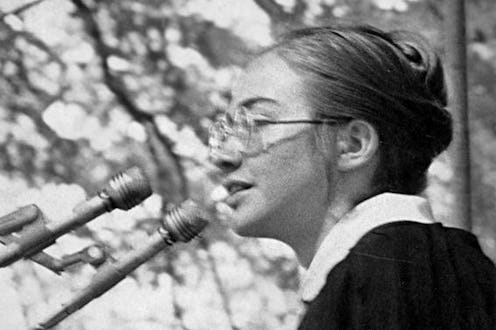News
Hillary Clinton's 1969 Graduation Speech

Destined to be a political force, Hillary Clinton's 1969 graduation speech gave the country a sneak peek at what would become a rich public service career spanning decades. Clinton, then just Hillary Diane Rodham, was chosen by her peers to be the first student speaker to deliver a commencement address at Wellesley College. Clinton electrified 400 of her peers at the women's liberal arts college with a fiery speech that captured the young generation's disillusionment over President Richard Nixon's war in Vietnam.
Republican Sen. Edward Brooke, the first black senator to ever be popularly elected and whose campaign Clinton once volunteered for, was the main speaker at the graduation. Brooke spoke first and suggested the anti-war protests sweeping across college campuses were a poor way of exercising students' constitutional right to assemble, saying "coercive protests" would discourage support from people empathetic to their cause. Clinton, who had led demonstrations against the Vietnam War on campus, wasn't afraid to take a moment to go off script and respond to Brooke's speech.
We're not in the positions yet of leadership and power, but we do have that indispensable task of criticizing and constructive protest and I find myself reacting just briefly to some of the things that Senator Brooke said. ... Part of the problem with empathy with professed goals is that empathy doesn't do us anything. We've had lots of empathy; we've had lots of sympathy, but we feel that for too long our leaders have used politics as the art of making what appears to be impossible, possible.
The speech, which went as viral as a story could go in 1969, led to a feature in Life magazine that highlighted student speakers across the country. Decades before she'd become a successful lawyer, first lady, New York senator, and U.S. secretary of state, Clinton was a rising young leader to watch.
Other inspiring excerpts from her speech? She declared the philosophical debate over what's possible and impossible for women shouldn't — and didn't — make them cynical. Instead, it was a call to action.
Years dominated by men with dreams, men in the civil rights movement, the Peace Corps, the space program — so we arrived at Wellesley and we found, as all of us have found, that there was a gap between expectation and realities. But it wasn't a discouraging gap and it didn't turn us into cynical, bitter old women at the age of 18. It just inspired us to do something about that gap.
Back then, young people jaded from the drawn out war in Vietnam struggled to grow into school, work, and life. Frankly, it's an existential crisis still facing today's generation that still has distinct memories of 9/11.
We are, all of us, exploring a world that none of us even understands and attempting to create within that uncertainty. But there are some things we feel, feelings that our prevailing, acquisitive, and competitive corporate life, including tragically the universities, is not the way of life for us. We're searching for more immediate, ecstatic, and penetrating modes of living. And so our questions, our questions about our institutions, about our colleges, about our churches, about our government continue.
Why speaking up matters...
Every protest, every dissent, whether it's an individual academic paper or Founder's parking lot demonstration, is unabashedly an attempt to forge an identity in this particular age.
...And why we should strive to be educated.
But we also know that to be educated, the goal of it must be human liberation. A liberation enabling each of us to fulfill our capacity so as to be free to create within and around ourselves.
Clinton would return to Wellesley in 1992 during the height of her husband Bill's first presidential campaign to give another commencement speech. The second time she took the podium she offered advice to women on how to balance work and life. But Clinton will always be known for her historic 1969 speech as her vibrant and passionate young mind stepped into the national spotlight. A full transcript of Clinton's memorable 1969 commencement address is available on Wellesley's website.
Image: Wellesley College